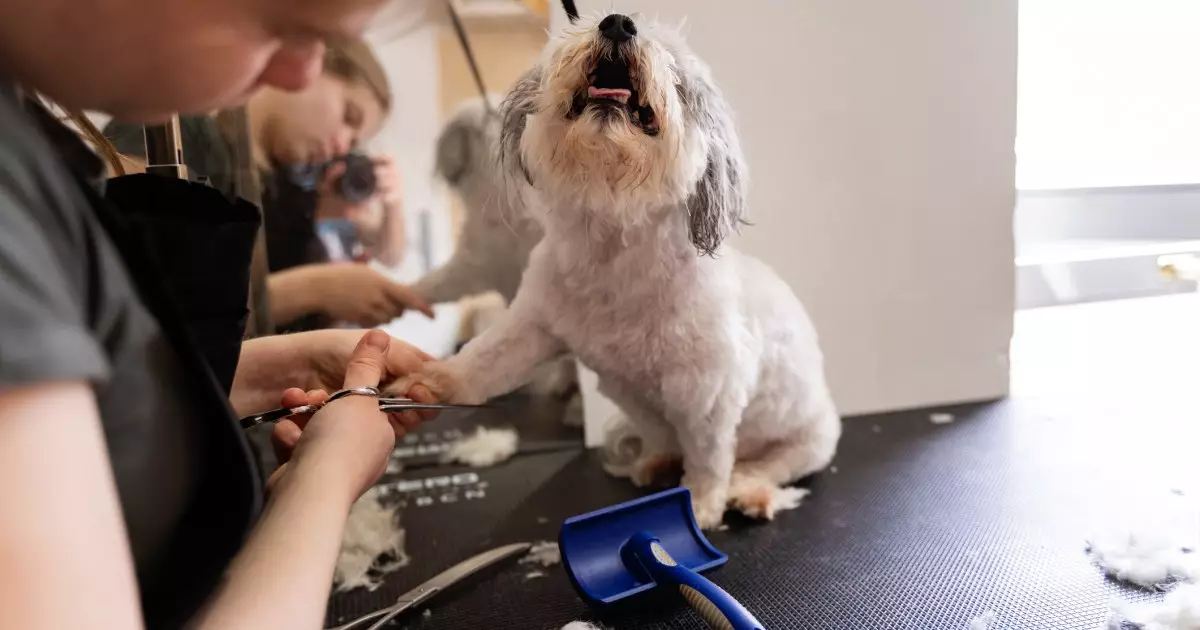In an event that has rippled through the pet care community, Susan Marucci, a 57-year-old dog groomer from Connecticut, faces serious allegations of animal cruelty. Previously employed at Pleasant Paws Pet Center, Marucci turned herself in to authorities after a warrant was issued in connection with an incident involving a standard Poodle named Abigail. The incident, which occurred on October 20, has raised significant concerns about the treatment of animals under professional care and the responsibilities of those entrusted with their welfare.
According to reports, Marucci expressed frustration during her grooming session, culminating in her allegedly lifting Abigail by her slip lead for an extended period. Eyewitness accounts detail that Marucci became so agitated that she screamed at the dog and eventually dragged it down a hallway. In a disturbing turn of events, the Poodle lost consciousness as Marucci continued to perform grooming tasks without regard for the dog’s distress. This incident has prompted discussions about the emotional and physical safety of pets in grooming facilities and the critical need for vigilance among staff and pet owners alike.
The situation surrounding Marucci raises essential questions about accountability in pet grooming establishments. If staff members witnessed the alleged abuse yet failed to intervene, it points to a troubling culture that may prioritize business operations over animal welfare. Such silence not only undermines the trust that pet owners place in grooming professionals but also signifies a potential systemic issue within the workplace environment itself.
Marucci’s defense claims that she acted in self-defense, stating the dog required a muzzle due to its perceived aggression. However, this rationale hardly mitigates the serious implications of her actions. It is essential to understand that professional groomers are trained to manage various temperaments in dogs; thus, resorting to physical restraints should be an absolute last resort, far removed from how the situation was handled in this case.
The community’s response to Marucci’s charges has been divided. While some neighbors and individuals familiar with her work have come to her defense, describing her as a dedicated pet lover and a respected board member of the Newtown Kennel Club and the Newtown Animal Control Advisory Board, it seems evident that an objective investigation into her actions is warranted. The cognitive dissonance between her professional roles and the allegations could highlight an unsettling reality: that even those hailed as pet advocates can exhibit behavior that is harmful to animals.
As Marucci awaits her court appearance, pet owners are left reflecting on their choices regarding grooming services. Trust is paramount when selecting caregivers for our beloved pets, and this incident underscores the absolute necessity of thorough research and critical evaluation of potential groomers.
Finding the Right Groomer: Tips for Pet Owners
In light of the recent incident, pet owners must take proactive measures to safeguard their pets during grooming sessions. Conducting diligent research is crucial. Recommendations from friends, family, and local veterinarians remain one of the best starting points. However, it is equally important to dive deeper into online reviews and the experiences of previous clients to ascertain the reputation of the groomer.
Scheduling visits to the grooming facility can offer crucial insights into how business operations prioritize animal welfare. Prospective clients should observe how groomers interact with pets and whether they exude a calm and caring demeanor. Questions about qualifications, certifications, and experience with various breeds should be routine. A knowledgeable groomer should willingly share their credentials and discuss grooming techniques tailored to specific breeds.
Communication about the products and tools employed in their practice is also essential; pet owners deserve assurance that their pets are handled with safe and high-quality materials. Ultimately, trusting one’s instincts during these evaluations is crucial. If any aspect feels amiss or if the pet appears stressed during initial interactions, it may be wise to explore other options in grooming care.
The alarming case of Susan Marucci serves as a wake-up call for both pet owners and professionals in the grooming industry. It accentuates the critical importance of accountability, the necessity for intervention in distressing situations, and the need for ongoing education within the sector. Moving forward, it is imperative that all stakeholders prioritize the safety and well-being of pets, fostering an environment that promotes kindness, compassion, and professionalism in dog care. As we navigate these complex issues, it remains the responsibility of the community to advocate for the best interests of their furry companions.

